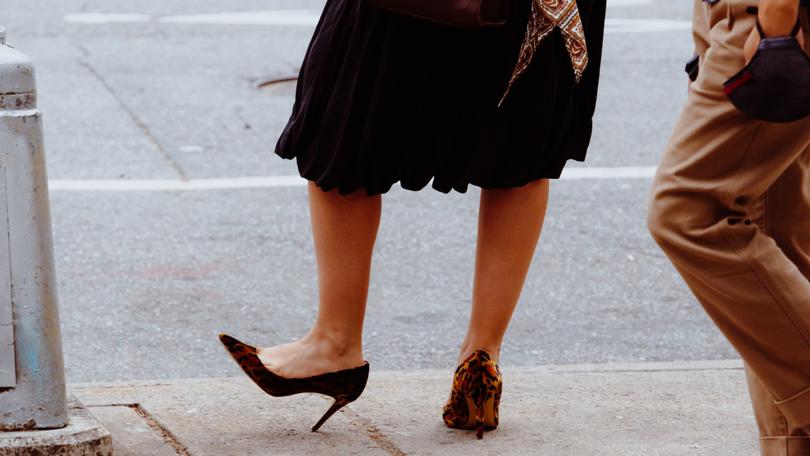The New York Times (Ask Vanessa): Why do women still wear stilettos?
Why are shoes that cause so much discomfort, are ridiculously impractical, and are plainly bad for the feet and body in general still worn by so many women?

(Ask Vanessa)
Q: Why do women still wear stilettos while men get to wear sneakers with their suits? Why are shoes that cause so much discomfort, are ridiculously impractical, and are plainly bad for the feet and body in general still worn by so many women who could choose not to wear them? — Monica, Boston
A: It is true, the death knell of the stiletto — that high heel invented in the 1950s that is balanced on a knife point and raises the back of the foot, thus transforming the female silhouette in ways that seem tailored to the pleasures of the male gaze — turned out to have been highly exaggerated.
Sign up to The Nightly's newsletters.
Get the first look at the digital newspaper, curated daily stories and breaking headlines delivered to your inbox.
By continuing you agree to our Terms and Privacy Policy.Sounded during the work-from-home days of social isolation during the coronavirus pandemic, it has receded into the cacophony of history as the return to office has heralded a return of somewhat more formal footwear. This is despite the fact that podiatrists are largely united in their conclusion that high, skinny heels are just not good for anyone’s skeletal structure.
So what gives? Well, a study in the journal BMC Public Health suggests that despite the physical negatives associated with wearing heels, there are also corresponding psychological positives. While stilettos force the calf muscles into high relief and tilt the pelvis backward, shifting the centre of gravity forward and putting an awful lot of stress on the ball of the foot and the back, they also elongate the legs and add height, bestowing on the wearer a sense of oomph.
Indeed, according to Tara Swart, a neuroscientist and senior lecturer at the Massachusetts Institute of Technology, our affinity for heels may be buried deep in our subconscious. Back in the cave-dwelling days, height was an evolutionary advantage, allowing female hunter-gatherers to reach food that otherwise would have been inaccessible. Also, that breasts-and-butt-out stance offered a leg up (so to speak) in the reproductive game.
“It is coded into our neurons and biases,” Swart said.
When I called Tamara Mellon — a former creative director of Jimmy Choo, the founder of a namesake shoe brand and a stiletto proponent — to ask why the style still sells so well, she said: “Heels create a mood and psychological shift, like doing the Wonder Woman stance for confidence. Your body language changes, muscles tighten, and there is nothing more powerful than looking someone in the eye, rather than looking up.”
“A lot of women I speak to in C-suite positions use heels as power,” she added. But not just the C-suite. When Nikki Haley announced her candidacy for president, she said: “You should know this about me — I don’t put up with bullies. And when you kick back, it hurts them more if you are wearing heels.”
All of this suggests that stilettos are not going away any time soon. The difference between ye olde days and today, however, is that they are now simply part of myriad options. Of Mellon’s Top 10 bestselling styles, she said, four are stilettos, and the rest are block heels or flats.
You can see this as a reclaiming of the stiletto — a weaponization of a shoe created to Barbie-fy women — or as women becoming complicit in their own pain. I choose to see it as yet another example of the fact that clothing has become optimized for the user, rather than for society. In the end, the freedom to choose what shoe you want to wear is what … well, sticks out.
Besides, it is possible to have your height and some risk mitigation, too. The problems caused by stilettos, as Dr. Sajid A. Surve wrote for the American Osteopathic Association, are less about the actual height of the heel than the pitch of the shoe. If the ball of the foot is on a platform, it means the actual slope is lower (and more comfortable).
If you do opt for heels, remember to stretch your feet and the back of your calves every night. Or just be strategic about your footwear choices.
“I usually travel in flats and then switch them out for a higher shoe as the occasion demands,” Swart said. “It’s a good balance.” No pun intended.
This article originally appeared in The New York Times.
© 2023 The New York Times Company
Originally published on The New York Times
